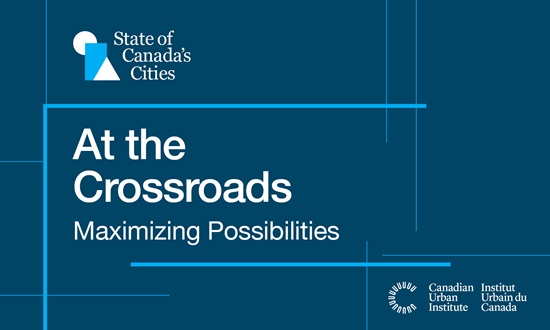 Monday, July 1, 2024
Monday, July 1, 2024  Monday, July 1, 2024
Monday, July 1, 2024 
With over 80 percent of the population living and working in urban communities, cities play a pivotal role in Canada’s social and economic development. However, long outdated fiscal and governance arrangements, complicated by a three-year pandemic has posed significant challenges for policy and investment decision-making. At this crucial juncture, Canadian Urban Institute (CUI) invited 40 policymakers, researchers, practitioners, and civic activists to assess the state of our cities. The results of their three years of work were recently released in the first annual State of Canada’s Cities Report.
For Canada to realize its potential, the report provides a bold roadmap for clear and practical changes, in 60 actionable steps that include decision-making, policymaking, investment choices, business practices and community norms.
“Since the arrival of COVID-19 to Canada, our cities have been besieged by challenges,” said Mary W. Rowe, CUI CEO and President. “Cities are places where people congregate, to earn, learn, contribute, exchange, and expand their lives and livelihoods. However, the pandemic and our collective response to it has shifted the evolving future of our cities. As we consider this uncertain future, we must embrace what we have learned if we want stronger Canadian cities in the future.”
The pandemic, coupled with technological advancements, climate change, equity, and reconciliation efforts, demands coordinated leadership across sectors to ensure Canadian cities meet the increasing needs of a diverse, growing population, Rowe explained.
“We need a much higher tolerance for trying new and perhaps risky approaches. We need alternate and flexible land building uses, tech-enabled mobility and climate strategies that harness the tacit knowledge of a well-established resource processing and manufacturing workforce,” she said. “We need to embrace new approaches to regional governance and the root causes of homelessness, addiction, and mental health. We need to find solutions that finally build financial sustainability for cities.”
CUI worked closely with University of Toronto’s School of Cities—the main supporter and partner on the State of Canada’s Cities report.
“Through its university partnerships, CUI ensures that researchers are tackling the questions that matter most to communities on the ground, while encouraging cities to experiment boldly with our innovations,” said Karen Chapple, Director, School of Cities. “Together, through rigorous research and open dialogue, we are launching an era of city and community rebuilding that transforms our great cities.”
Chapple goes on to say: “Our cities power Canada’s competitiveness and the well-being of its people. At a time of global crisis, our cities are our greatest strength—and Canadian cities are ranked among the best in the world. Thus, together we must address the multiple threats to their affordability, civic infrastructure, and quality of life. We must build a national—and then global—network of urban research and civil society institutions that identifies and implements the creative approaches that empower cities to lead the way. The stakes could not be higher.”
Over the last four years, CUI heard a “resounding rejection of the status quo and a hopeful call for creative ideas” that support on-the-ground action.
“It is critical we create more housing especially more affordable housing, welcome and support new Canadians, make places for recreation and cultural expression, stimulate and support local economies, renew downtowns as places for people and commerce, and support hyper-local approaches to building community resilience and inclusion,” Rowe said.
The report, which is now available, was recently released in Ottawa at the State of Canada’s Cities Summit at the Shaw Centre that brings together several hundred influential Canadians to chart the right course for addressing key urban challenges. The Summit will identify priorities and explore solutions for robust growth that supports local communities coming out of a devastating global pandemic.